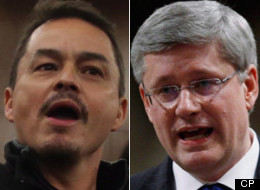OTTAWA - The Harper government must choose between "collaboration or collision" with Canada's Aboriginal Peoples when it comes to proposed energy projects, the head of the Assembly of First Nations warned Thursday.
First Nations must be a part of any energy projects that affect them or their lands, and will not back down if they feel their rights are not being respected, Shawn Atleo said in an interview.
"We will stand firm in our rights. We will have a say," he said.
"It's brought us to this moment of collaboration or collision. It's a very clear moment of decision of what the next steps are going to look like."
A "collision" might well involve further legal action or possibly even conflict, he warned.
"We've seen it in the courts. On average, we've got 100 aboriginal title and rights court cases that clog up the courts. You know, highly conflict-filled," Atleo said. When resource development has proceeded without First Nations consent, it has resulted in "conflict on the ground," he added.
Prime Minister Stephen Harper has staked a great deal of political capital on turning Canada into an energy powerhouse. But there has been a recognition by governments and industry that doing so requires the co-operation of First Nations people.
The federal government recently dispatched high-ranking bureaucrats to British Columbia to listen to First Nations concerns over the proposed Northern Gateway pipeline and other energy projects in Western Canada.
Some First Nations oppose pipelines or other energy projects on their lands, while others are more open to working with government and industry.
"In my conversations with the chiefs ... they welcomed having the growing recognition, it appears, that like we've been pressing for so long, that First Nations must be engaged directly," Atleo said.
Getting those West Coast energy projects off the ground took on a new sense of urgency Thursday after TransCanada announced it would not file an application for its proposed Energy East Pipeline with the National Energy Board until next year.
The 4,500-kilometre Energy East Pipeline would ship up to 1.1 million barrels per day of oil from Alberta to refineries and export terminals in Quebec and New Brunswick.
Meanwhile, Atleo said he sees the government's upcoming throne speech as a chance for the government to deliver on commitments made at a politically charged meeting this past January between Harper and First Nations leaders.
Some of those areas include the implementation of treaties, reforming the comprehensive claims negotiation process, funding and reform of First Nations education and an inquiry into murdered and missing aboriginal women and girls, he said.
Original Article
Source: huffingtonpost.ca
Author: Steve Rennie
First Nations must be a part of any energy projects that affect them or their lands, and will not back down if they feel their rights are not being respected, Shawn Atleo said in an interview.
"We will stand firm in our rights. We will have a say," he said.
"It's brought us to this moment of collaboration or collision. It's a very clear moment of decision of what the next steps are going to look like."
A "collision" might well involve further legal action or possibly even conflict, he warned.
"We've seen it in the courts. On average, we've got 100 aboriginal title and rights court cases that clog up the courts. You know, highly conflict-filled," Atleo said. When resource development has proceeded without First Nations consent, it has resulted in "conflict on the ground," he added.
Prime Minister Stephen Harper has staked a great deal of political capital on turning Canada into an energy powerhouse. But there has been a recognition by governments and industry that doing so requires the co-operation of First Nations people.
The federal government recently dispatched high-ranking bureaucrats to British Columbia to listen to First Nations concerns over the proposed Northern Gateway pipeline and other energy projects in Western Canada.
Some First Nations oppose pipelines or other energy projects on their lands, while others are more open to working with government and industry.
"In my conversations with the chiefs ... they welcomed having the growing recognition, it appears, that like we've been pressing for so long, that First Nations must be engaged directly," Atleo said.
Getting those West Coast energy projects off the ground took on a new sense of urgency Thursday after TransCanada announced it would not file an application for its proposed Energy East Pipeline with the National Energy Board until next year.
The 4,500-kilometre Energy East Pipeline would ship up to 1.1 million barrels per day of oil from Alberta to refineries and export terminals in Quebec and New Brunswick.
Meanwhile, Atleo said he sees the government's upcoming throne speech as a chance for the government to deliver on commitments made at a politically charged meeting this past January between Harper and First Nations leaders.
Some of those areas include the implementation of treaties, reforming the comprehensive claims negotiation process, funding and reform of First Nations education and an inquiry into murdered and missing aboriginal women and girls, he said.
Original Article
Source: huffingtonpost.ca
Author: Steve Rennie

No comments:
Post a Comment